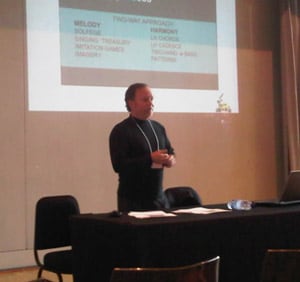An interactive workshop with Stephen Couldridge: Creating Creative Thinkers Through Music
 Yamaha’s own Stephen Couldridge, National Manager of Music Education, along with top researchers, neuroscientists, parents and child development workers joined the first annual Brain Power Conference, organized by the Brain Power Initiative, on May 3-4.
Yamaha’s own Stephen Couldridge, National Manager of Music Education, along with top researchers, neuroscientists, parents and child development workers joined the first annual Brain Power Conference, organized by the Brain Power Initiative, on May 3-4.
The Brain Power Initiative brings together some of the world’s leading neuroscientists, researchers, teachers and industry luminaries to explain how the findings of science are having a long-lasting impact on how children grow and prepare for lifelong learning.
The Conference offered a range of topics and inspiring talks by leading scientists and visionaries on how science will inform a new era in childhood development and education where parents and teachers were exposed to practical hands-on information to help their child grow and develop and workshops on how the lessons of science are helping to transform the classroom.
Jennifer Vidal, a mother of three who writes about parenting issues in her blog “M” is for Marriage and Motherhood, attended the conference and had this to say:
“At the conference, after hearing Dr. Sylvain Moreno explain how much the brain benefits from musical activities, I decided to attend the two workshops whose titles indicated more insight on the topic—“Creating Creative Thinkers Through Music” and “Frontiers of Research: Effects of Musical Experience in Infancy.” I saw these workshops as an opportunity to learn what I can do to enhance my kids’ ability to learn faster and better through music.”
“At the “Creating Creative Thinkers Through Music” workshop, I learned that the optimum age for a child to start learning the language of music is between the ages of three and six, though anyone can learn music at any age after that, according to Stephen Couldridge, national manager of the music education Department at Yamaha Canada Music Ltd. in Toronto. I also learned about the importance of timely education, which is a concept in which the student is guided according to his or her physical and mental development. For instance, since the sense of hearing develops most rapidly between the ages of four and six, instructions at [Yamaha’s] schools are focused more on training the ear rather than on developing keyboard-playing skills, though these skills are also taught. The focus on keyboard-playing skills increases as children progress through the course, according to Couldridge.”
To read the rest of Jennifer’s article entitled “How Neuroscience Opened My Eyes to Helping My Kids Reach Their Full Potential”, visit Our Kids
To learn more about the Brainpower Initiative, visit www.brainpowerinitiative.com
Click here to learn more about the Yamaha Music Education System.
